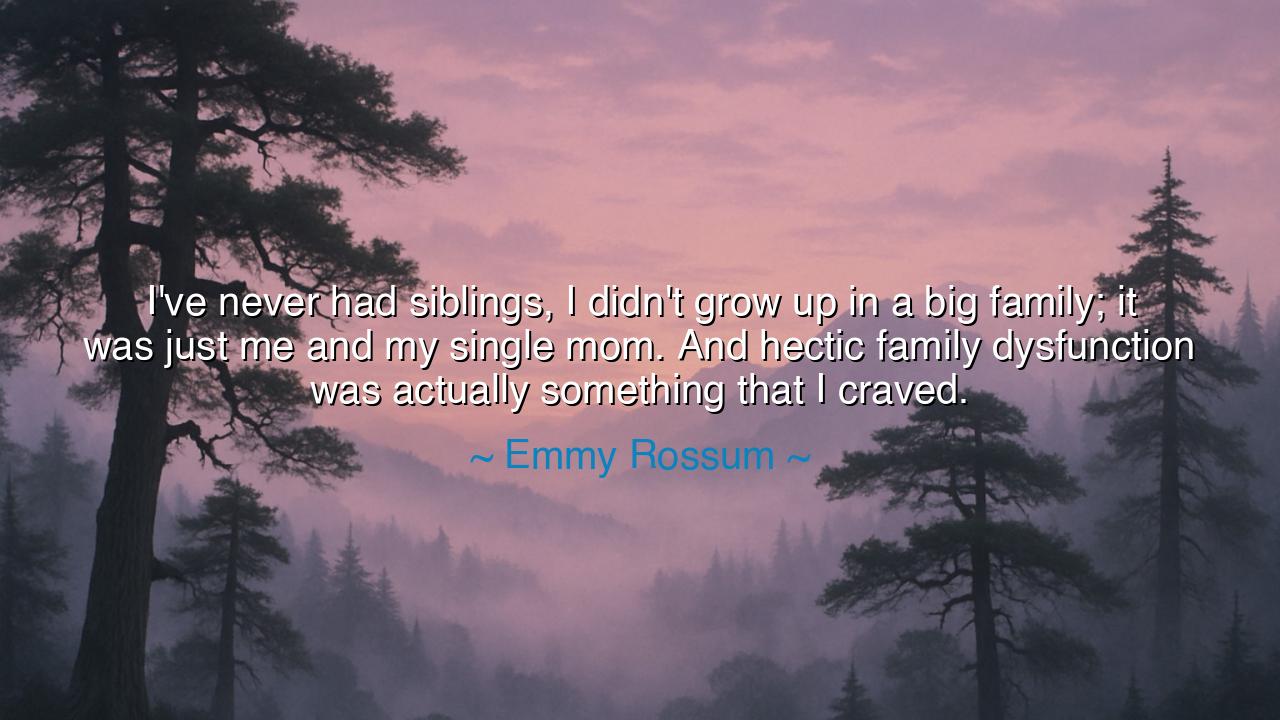
I've never had siblings, I didn't grow up in a big family; it was
I've never had siblings, I didn't grow up in a big family; it was just me and my single mom. And hectic family dysfunction was actually something that I craved.






When Emmy Rossum said, “I’ve never had siblings, I didn’t grow up in a big family; it was just me and my single mom. And hectic family dysfunction was actually something that I craved,” she revealed a truth as ancient as human longing itself — the yearning for belonging, even amidst chaos. Beneath her calm confession lies the paradox of the heart: that even pain, when shared, feels like connection; and that loneliness, when left too long, begins to hunger for noise, for conflict, for life in motion. Her words are not about dysfunction alone, but about the deep human desire to be part of something larger than oneself — even something imperfect.
The ancients understood this yearning. In every culture, the family was seen not as a mere social structure, but as the first reflection of the cosmos — an ordered, living system through which the soul learns harmony and struggle. To grow up outside that pattern, as Rossum did, is to dwell in quietness — protected, perhaps, but separate from the storm where bonds are tested and love is forged in fire. Thus, when she speaks of craving “hectic family dysfunction,” she is not praising turmoil, but longing for messy intimacy — the noise, laughter, arguments, and reconciliations that make one feel woven into the tapestry of human warmth.
Her upbringing — alone with a single mother — shaped her understanding of love as both powerful and isolating. The single parent, heroic in endurance, gives everything, but the child grows up surrounded by a kind of sacred silence. There are no siblings to mirror one’s feelings, no father’s voice to counterbalance the mother’s tone, no shared mischief to dissolve tension. The world becomes ordered, precise, intimate — yet narrow. In such solitude, one begins to imagine the chaos of others as colorful, even enviable. The shouting of siblings, the clash of opinions, the occasional slammed door — these become symbols of connection, proof of life’s fullness. Rossum’s confession thus speaks to the ancient wound of those raised in quiet — the ache not for perfection, but for participation in the vibrant imperfection of family.
History offers many examples of this yearning. Consider the Roman emperor Marcus Aurelius, who, despite ruling over millions, often wrote in his Meditations about feeling alone in spirit — surrounded by people, yet isolated in understanding. He longed for the simplicity and closeness of family, even as he bore the crown’s heavy solitude. In his words, “Men seek retreat for themselves, in the country, by the sea, or in the mountains; but it is in the power of a man to retire into himself.” Like Rossum, he reminds us that loneliness is not just the absence of others — it is the absence of shared chaos, of connection that makes the soul feel real. We do not merely need peace; we need presence.
There is something deeply courageous in Rossum’s honesty. Most people run from dysfunction; she admits to craving it — not because she desires pain, but because she sees in it the heartbeat of life. In that chaos lies authenticity, raw emotion, and unfiltered humanity. Where there is disorder, there is truth. In the stillness of an orderly life, love can feel controlled, rehearsed, even distant. But in the disarray of family — in tears and laughter tangled together — there is a deeper kind of beauty, one that speaks of acceptance rather than control.
Her words also reveal an important lesson for the modern soul: that belonging is not found in perfection. Many chase the ideal of harmony — the flawless family, the calm relationship, the silent home — only to discover emptiness in the stillness. The heart, by nature, is drawn to motion. It seeks not the absence of trouble, but the presence of meaning. To crave the noise of family is to crave life itself — unpolished, unpredictable, but undeniably real.
So, let this reflection serve as a teaching for future generations: Do not fear the mess of love. Do not turn away from imperfection. Whether your family is large or small, chaotic or calm, embrace the lessons that each dynamic brings. For connection is not the opposite of chaos — it is born from it. The warmth you long for may not come in silence, but in the laughter that follows a quarrel, the forgiveness that follows misunderstanding, the resilience that grows from shared imperfection.
In the end, Emmy Rossum’s words remind us that the soul’s deepest hunger is to belong — not to an ideal, but to a human reality. To crave “hectic dysfunction” is, in truth, to crave love with all its thorns. And when one learns to see even the noise and friction of life as sacred, one has entered the wisdom of the ancients — where love, in all its flawed beauty, is both the wound and the healing.






AAdministratorAdministrator
Welcome, honored guests. Please leave a comment, we will respond soon